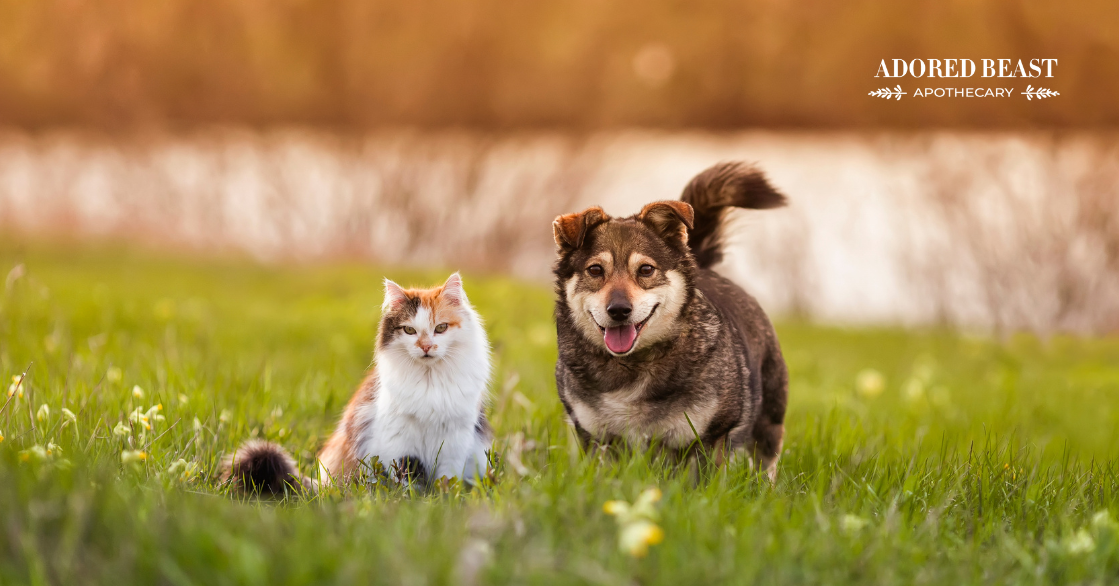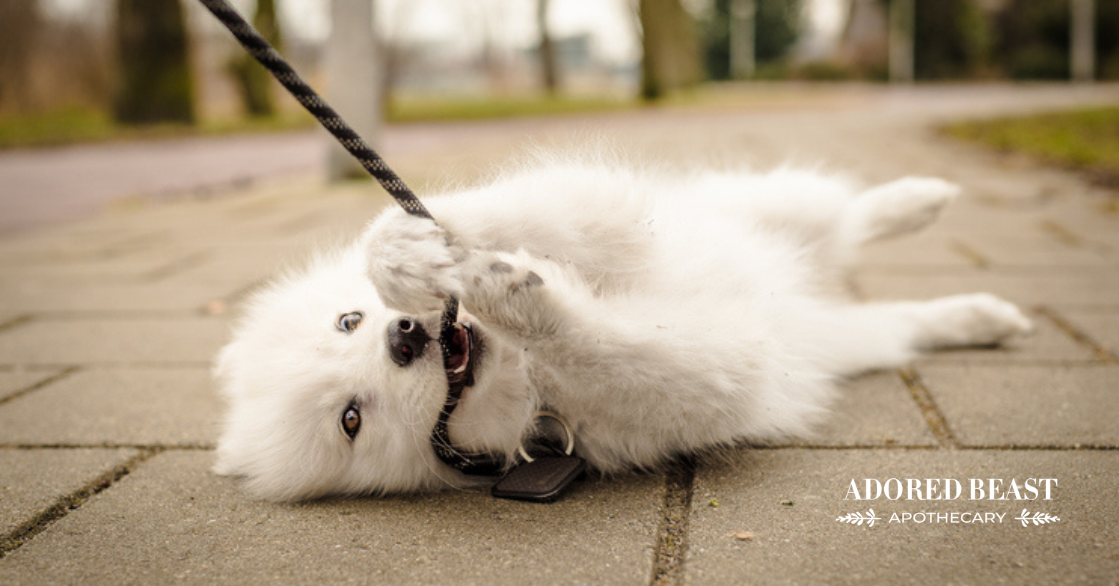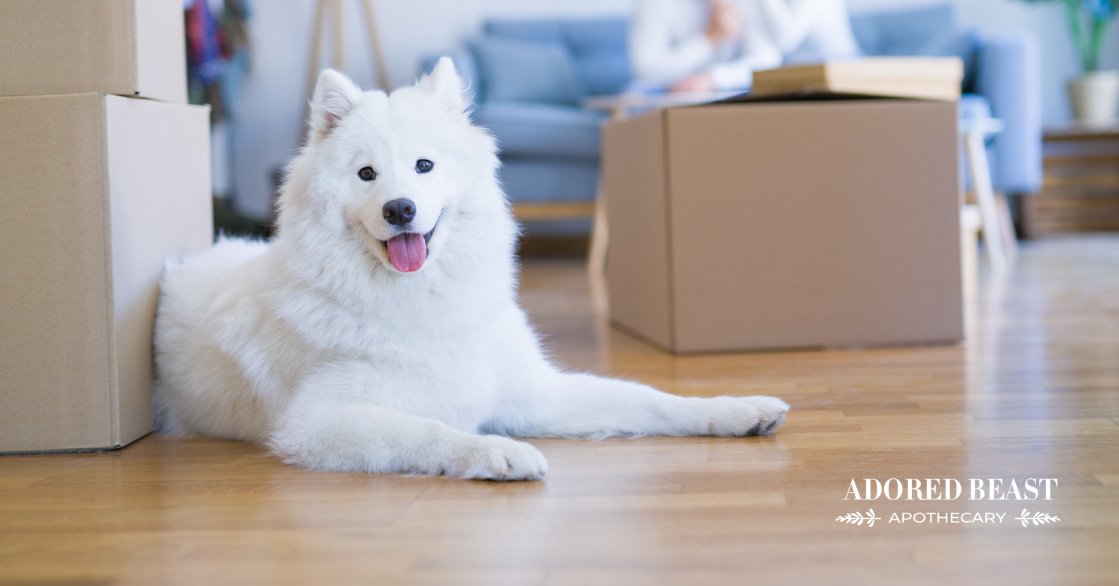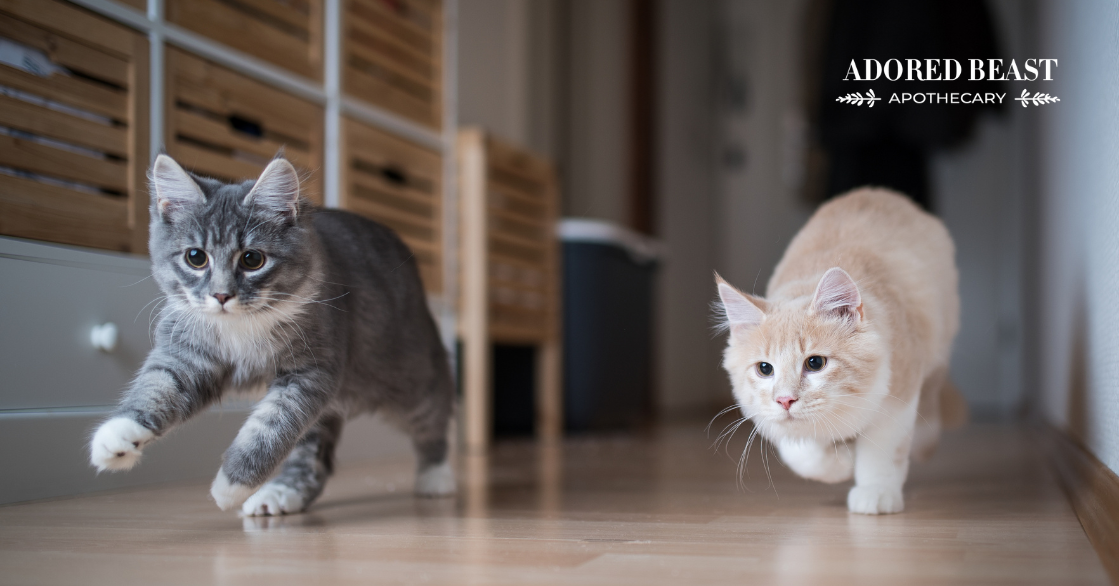If you know us at all, you know that gut health is a big thing here at Adored Beast. A lot of what we do each and every day revolves around it – whether that be raising awareness, reading and understanding the latest studies, doing our own research and development, or formulating products with gut health in mind.
After all, if the gut isn’t healthy, your pet can’t be healthy. Overall health depends on gut health. And that makes sense, since as much as 80% of the immune system is in the gut.
Unfortunately, far too many things can damage the gut: antibiotics and prescription drugs, over-vaccination, stress, process food, etc. Knowing that, it’s critical to do all that you can to support this all-important system of the body.
The thing is, people often think probiotics when they hear support gut health. And that’s good – probiotics can play a major role in re-establishing healthy bacterial colonies in the gut.
But you can’t just give probiotics and be done with it. Today, we’re going to talk all about the importance of prebiotics for dogs and cats and why they too are necessary to maintain a thriving gut microbiome!
What are Prebiotics for Dogs and Cats?
Remember: probiotics are the friendly bacteria that colonize in the gut and form an important part of the microbiome (this is like the conductor of the orchestra, communicating with all the systems of the body and telling them what to do). Probiotics work to crowd out the harmful bacteria, keep the system in homeostasis, and regulate the immune system.
Prebiotics are a type of soluble, indigestible fiber that feeds probiotics.
Think of it like a garden. The probiotics are the seeds. You plant all different varieties – maybe some wildflowers, some veggies, some herbs. These are the foundation, and they’ll grow to fill out your garden bed.
But only if you treat them right and give them what they need.
Enter: Prebiotics.
Prebiotics are the water and the fertilizer (the egg shells or coffee grounds) that feed the seeds and help them grow and flourish. Without these, the plants will die. The same goes for probiotics – if you don’t support them, they starve. Prebiotics feed the beneficial bacteria colonies in your animal’s gut.
If you’re feeding probiotics – kefir, for example, or a probiotic supplement – but not feeding prebiotics at the same time, those probiotics essentially become wasted.
Plus, by working together, certain pre and probiotics result in something called postbiotics. Postbiotics are the result of probiotics eating prebiotics. That’s right! When you feed probiotics with prebiotics, those probiotics break them down and convert them into metabolites! Short-chain fatty acids (SCFAs), functional proteins, and extracellular polysaccharides (EPS) are just three impressive examples.
So, as you can see, prebiotics are a very important part of the equation!
[RELATED] What’s the Best Probiotic for Dogs (& When Should You Use it)?
Sources of Prebiotics
Now that we know prebiotics are important, where can you find them? These are what we feel are the best sources of prebiotics for dogs and cats:
Arabinogalactans
Our favourite prebiotics are arabinogalactans which you can find in abundance in the larch tree. Since it’s something that animals would consume in the wild, we consider it a really healthy source of species-specific probiotic. Larch is for sure more costly than the majority of prebiotics out there but so worth it when you see read the research of the benefits.
That said, it’s also found in small amounts in some foods. Our favorites are coconut and carrots. It’s also found in many herbs, such as echinacea and astragalus. The thing is, you need to eat a lot of these foods and herbs to get the full benefits, so it’s best to go with a larch supplement. That’s why many of our products include larch as the main prebiotic, including Fido’s Flora, Love Bugs and Healthy Gut.
Medicinal Mushrooms
Medicinal mushrooms are another great source. They are high in healthy polysaccharides, which feed those probiotics. Additionally, medicinal mushrooms like chaga and turkey tail come with a whole host of other benefits. Their antioxidant, anti-inflammatory, and anti-tumor profiles are all top-notch. Both are also potent immune-modulators. This means that they balance the immune system.
Tripe
Oh tripe. What pet owner doesn’t love the aromatic wonder that is tripe. This is another good species-appropriate prebiotic food. Plus, tripe contains pre-digested plant matter, digestive enzymes, and probiotics. It’s also high in protein and an excellent addition to the raw diet for several meals per week. Most dogs love the taste. Just be sure to get green tripe, not bleached tripe! Here’s more about tripe.
Fruits and Vegetables
Many different fruits and vegetables contain prebiotics, making them an easy way to get this essential element into your animal’s diet. Berries, apples, bananas, and watermelons are good sources when it comes to fruit. For vegetables, cabbage, dandelion greens, asparagus, broccoli, and cauliflower are high in prebiotics. Of course, these are more for dogs than cats since cats typically only need about 5% or less in their diets.
Chlorella
Chlorella is a single-celled, green, freshwater microalgae. And it has an impressive list of characteristics that make it an important element in an animal’s (or human’s) diet. It’s a very good source of nutrients including protein, vitamins and minerals, antioxidants, and omega-3s. That’s why we use it in our Soil & Sea.
Prebiotics for the Win
Understanding how probiotics depend on prebiotics to thrive and support the gut, it should come as no surprise that we’d focus on both. That’s why we initially created Love Bugs, and followed with our other probiotic supplements containing larch. Making sure that your pet’s probiotics can do their job effectively is important, and that’s why prebiotics for dogs and cats should always be at the top of your list!












![[RESEARCH] Is Herbicide Safe for Dogs?](https://blog.adoredbeast.com/wp-content/uploads/2025/06/herbicides-safe-for-dogs-103x55.png)